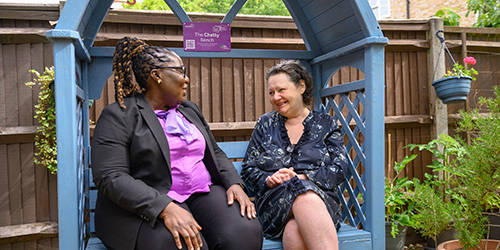- Home
- Media centre
- Press room
- New research exposes UK’s reluctance to talk about dementia
7 April 2021
New research exposes UK’s reluctance to talk about dementia
New research by Anchor Hanover has revealed the nation’s lack of awareness of the prevalence of dementia, and our deep-rooted reluctance to think and talk about it.
With worrying data suggesting rates of dementia diagnosis have fallen during the pandemic, Anchor Hanover is launching a guide to help people start these important conversations, so that families can proactively plan for dementia and ensure anyone who does develop it can still lead a fulfilling life.
Vastly underestimating prevalence
According to industry figures, there are more than 850,000 people living with dementia in the UK and this figure is projected to rise to more than 1.5 million by 2040. Today, a person is diagnosed with dementia every three minutes.
Yet, awareness of those figures among the public remains worryingly low, with 34% admitting they do not know how prevalent dementia is. On average, the public underestimates its prevalence by 40%, and only 5% of the nation can correctly estimate the true figure (209,600).
Burying our heads in the sand
This lack of awareness has a worrying impact on the way we think about and plan for dementia – masking the reality that, when you proactively plan for dementia and have the right support, you can still live a fulfilling life.
Nearly half (48%) of the UK population have never considered they might one day develop dementia, with only 12.5% of people aged 65+ thinking they might one day be living with it.
The new figures also show that as a nation, the UK is remarkably reluctant to think and talk about dementia. Nearly half (47%) have never had a conversation about it with loved ones and the public would much rather discuss divorce, break-ups and our weight, than dementia. Strikingly, one in three (32%) simply bury their head in the sand and ‘don’t want to talk about it’.
Furthermore, of the conversations the nation does have about dementia, half of these happen only when a loved one has already developed dementia and decisions need to be made about their care.
Breaking the taboo
The research exposes a mismatch between people’s feelings and actions. 59% of the public worry about their loved ones getting dementia and the vast majority say they want the very best for their loved ones in later life. Yet 29% of those who’ve not had a conversation with their loved ones about dementia, say it’s because they don’t want to worry them.
The implications of this have been brought into sharp relief by the COVID-19 pandemic, with recent NHS data showing a decline in the number of dementia diagnoses since the pandemic began. Promisingly, there are signs of change, as the pandemic has encouraged people to rethink what they want from their lives. Over half (56%) of the public say that the pandemic has made them realise the importance of planning for later life and it has made them think more about later life care for themselves and their loved ones (51%).
Encouragingly, those figures are the highest among younger age groups – suggesting that the nation is at a tipping point when it comes to proactively planning for our later years.
Responding to the research, Jane Ashcroft CBE, Chief Executive of Anchor Hanover, said:
It’s encouraging that more people are realising the importance of planning for later life. Yet, far too many of us still avoid talking with loved ones about dementia, despite the fact that an open and honest conversation is a vital starting point to preparing ourselves for what might come.
Dementia has been a taboo for far too long and it’s time to break the silence. For many, discussing dementia can be embarrassing and uncomfortable but it doesn’t have to be. Only through conversation can we ensure that the right decisions can be made at the right time and that for anyone who does develop dementia, there’s a plan in place to help ensure they can still live their life to the full.
Chair of the Longevity and Adult Social Care APPGs, Rt Hon Damian Green MP, said:
This is important and timely research. The first step towards better living for those with dementia and their loved ones is to have a wider recognition of its effects. This must lead to a more sensitive attitude to the housing and other requirements of those with dementia, and action to address the many problems that ensue.
To encourage more open conversations about dementia among families, Anchor Hanover has launched a ‘Reframing Dementia Guide’. With one in seven of the public saying they wouldn’t know where to turn for information about dementia, the Guide offers a practical compendium of knowledge, with practical tips about how to start conversations about later life care and advice on how to support those who are living with the condition.
With two thirds of the public unaware that specialist dementia care homes are available to themselves and their loved ones, the Guide explains the care options available for people with dementia. It also offers a glimpse into the life at one of Anchor Hanover’s specialist homes, hoping to break the taboo by showing what’s possible for people living with dementia, thanks to the advancements in care, technological developments and the expertise and dedication of specialist dementia carers.
 Chris Howard’s mother Sarah (80) was diagnosed with dementia in 2013 and moved into Anchor Hanover’s Linwood care home in 2018. Chris said:
Chris Howard’s mother Sarah (80) was diagnosed with dementia in 2013 and moved into Anchor Hanover’s Linwood care home in 2018. Chris said:
Following her diagnosis, my mum’s health has deteriorated over time, in part due to the loneliness she was experiencing. Latterly, she was becoming very out of touch, introverted and had real problems with isolation. Almost as soon as she moved into the care home, her mental state improved. She now has contact with people throughout the day and she’s better, happier and more her ‘old self’ than ever before.
There definitely should be more conversation about dementia. It feels like society is not dealing with dementia properly and people don’t fully understand what it is, how it affects people and how to support those who are living with it. Dementia is a scary word but it’s not a life sentence – if managed properly, with the right support, people can maintain a fulfilling lifestyle.
Laura Simpson (27) Team Leader at West Hall care home, who helped develop the Guide, said:
Having worked in dementia care for seven years, I’ve seen first-hand the difference that specialist care can have to residents’ lives. With tailored activities, bespoke care, and a completely personalised approach, we encourage and promote choice and independence for all our residents, giving them the quality of life the deserve. People with dementia still have dreams and aspirations and they shouldn’t be treated any differently to the rest of us.
The research follows the publication of a report from the All-Party Parliament Group (APPG) on Housing and Care for Older People, sponsored by Anchor Hanover. The Housing for people with dementia – are we ready? report has found that progress in developing suitable homes for those living with dementia has been too slow. The APPG warned that, unless the issue was addressed, increasing numbers of people in the UK’s ageing society will be unable to find housing which supports their needs.
Download the Reframing Dementia Guide
To find out more about how you can start conversations with your loved ones, please visit our related pages below.
Related information about dementia
This website uses cookies which track activity so that you get the best possible experience. By continuing to use this website we will assume you are happy and cookies will be set. You can change your cookie settings at any time.












